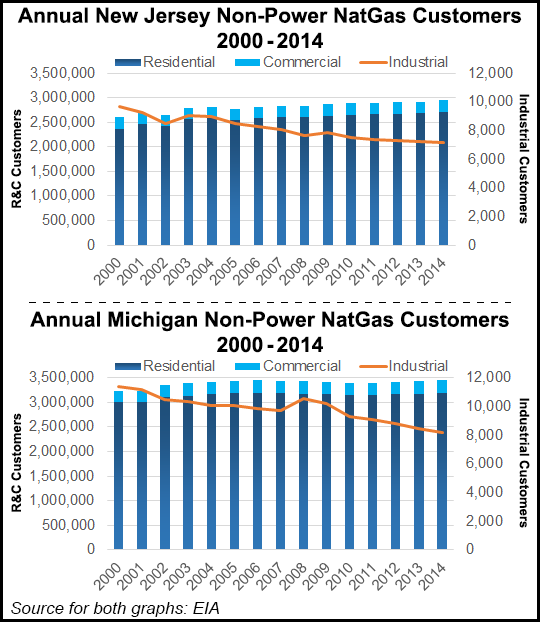Infrastructure | NGI All News Access | NGI The Weekly Gas Market Report
Utilities Announce Billions in Investments in NatGas Infrastructure, Generation
Two major U.S. utilities recently announced five-year plans to invest billions in their natural gas infrastructure.

New Jersey-based Public Service Enterprise Group (PSEG) is planning $16 billion in capital investments in its electric and gas utilities and its power generation fleet over the next five years, the company told investors at a conference late last week. PSEG said “the bulk” of the planned investments will be made in New Jersey.
PSEG’s largest subsidiary is Public Service Electric and Gas Co. (PSE&G), which serves 1.8 million gas customers and 2.2 million electric customers in New Jersey.
“We’re replacing and upgrading critical transmission lines, making our systems more resilient…and modernizing 510 miles of older gas mains,” PSEG CEO Ralph Izzo said. “We are focused on future energy needs, and these necessary upgrades will help to ensure the reliability and safety of our electric and gas systems for our 2.2 million customers for the future.”
Over the last year, PSEG Power, the utility’s electric generation segment, has announced more than $2 billion in investments in three new combined cycle plants: the 485 MW Bridgeport Harbor Station in Bridgeport, CT; the 540 MW Sewaren 7 in Woodbridge, NJ; and the Keys Energy Center, a 755 MW plant in Prince George’s County, MD.
“PSEG Power’s capital program is focused on growth investments of efficient, clean, gas generation which enhance our fleet’s competitive market position,” Izzo said. “The addition of Keys, Sewaren and Bridgeport Harbor will bring PSEG Power’s fleet to more than 13,000 MW of generating capacity.”
Meanwhile, Detroit-based DTE Energy announced Wednesday that subsidiary DTE Gas will invest $1.4 billion over the next five years to upgrade its natural gas pipeline infrastructure in Michigan. The utility said it will “modernize its cast iron and steel main pipelines with newer, more durable material, and new service lines to homes and businesses also will be installed.”
DTE said it’s on track to replace more than 100 miles of gas main lines in 2016, up from about 80 miles in 2015, with plans to continue accelerating the pace of the upgrades.
Also as part of its modernization efforts, DTE will replace gas meters inside homes with advanced meters outside the homes, and it will upgrade its compressor stations.
DTE Gas CEO Mark Stiers said the utility will maintain “affordable” rates for customers even with the planned $1.4 billion in investments, thanks in large part to cheap natural gas.
“Lower natural gas prices have significantly reduced bills for our customers, who can be assured that they will continue to have a safe, reliable natural gas system,” Stiers said.
DTE Gas serves approximately 1.2 million customers in Michigan, owning and operating 278 storage wells.
© 2024 Natural Gas Intelligence. All rights reserved.
ISSN © 1532-1231 | ISSN © 2577-9877 | ISSN © 1532-1266 |
